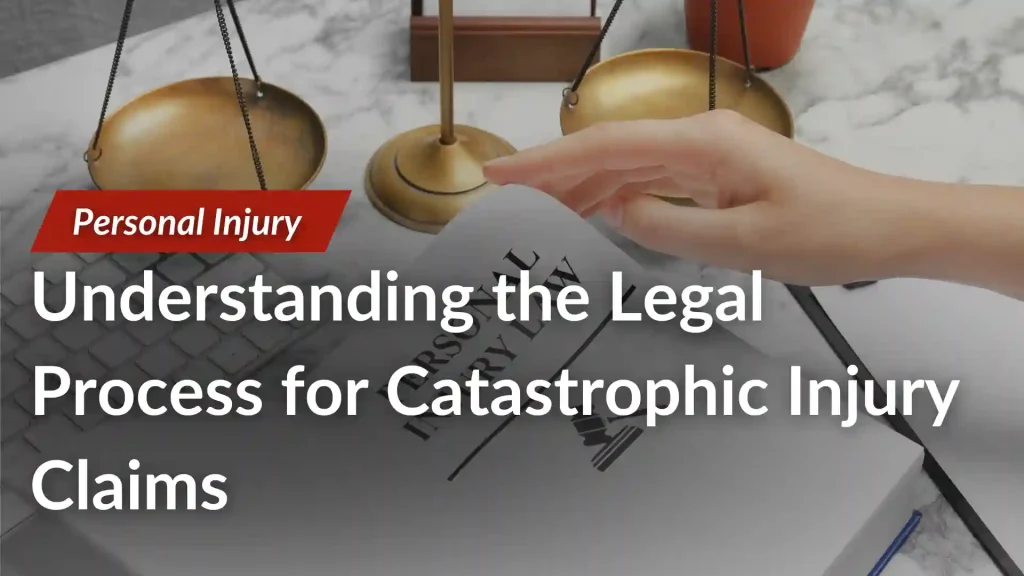 Compensation for accident-related injuries varies. However, one of the most significant factors that can influence personal injury compensation is the severity of a victim’s injuries. Catastrophic injuries can change a person’s life, causing physical disabilities and mental turmoil and leaving a person’s financial future uncertain. Still, there is some confusion over what the term “catastrophic injury” means and how these types of severe injuries can impact a person’s pursuit of fair compensation.
Compensation for accident-related injuries varies. However, one of the most significant factors that can influence personal injury compensation is the severity of a victim’s injuries. Catastrophic injuries can change a person’s life, causing physical disabilities and mental turmoil and leaving a person’s financial future uncertain. Still, there is some confusion over what the term “catastrophic injury” means and how these types of severe injuries can impact a person’s pursuit of fair compensation.
Understanding the legal process for catastrophic injury claims is not easy because of the complexities of Tampa, Florida’s legal system. Breaking down what catastrophic injuries are and who can file a personal injury lawsuit puts you in a better position to exercise your legal rights and find the help you need.
What Is a Catastrophic Injury?
There is no strict medical definition for catastrophic injury. Regardless, most people use the phrase to describe any injury that causes significant or permanent impairment or interferes with a person’s quality of life, which is why understanding the claims process for catastrophic injuries is so vital for securing the care and compensation you need.
Florida does go so far as to outline the legal definition of a catastrophic injury, calling it a permanent impairment to an individual’s physical or mental abilities. Examples of catastrophic injuries under Florida law include:
- Spinal cord injuries that involve paralysis of an arm, leg, or the torso
- Amputation of an arm, hand, foot, or leg
- Severe traumatic brain injury
- Second or third-degree burns on 25 percent or more of the total body surface or third-degree burns on five percent or more of the face and hands
- Total blindness
The state also considered injuries that would qualify employees for disability or supplemental security income benefits as catastrophic injuries.
Who Can File a Catastrophic Injury Lawsuit?
Motor vehicle accidents follow unique rules for when a victim can file a personal injury lawsuit. Under Florida’s no-fault insurance system, individuals involved in an accident must turn to their insurance provider’s personal injury protection, or PIP coverage, to compensate them for their reasonable and necessary medical expenses. However, most people’s PIP coverage tops out at $10,000, not nearly enough to cover the cost of medical care related to a catastrophic and life-changing injury like paralysis or an amputation.
An injured person can file a claim against the at-fault party’s insurance company. Thus, their claim can pursue money for medical expenses and lost wages that exceed the limits of their PIP coverage. However, they cannot obtain compensation for pain and suffering and other intangible losses that way. Accident victims can step outside of the no-fault system to file a personal injury lawsuit if their injuries meet Florida’s legal “serious injury threshold.”
Some of the most common negligence-based situations that may lead to catastrophic injuries and a personal injury case include:
- Car accidents
- Truck accidents
- Motorcycle accidents
- Pedestrian accidents
- Bicycle accidents
- Boat accidents
- Dog bites or dog attacks
- Premises liability cases
While no-fault and serious injury threshold rules limit motor vehicle accident cases, they have no effect on other negligence-based cases. A victim suffering catastrophic injuries due to the careless actions of another has no legal threshold to meet and can sue the at-fault party for compensation for their injuries.
Although the thought of filing a personal injury lawsuit to pursue the compensation you need may be daunting, sometimes it is the best way to recover the money you need for your extensive current and future medical expenses. Since catastrophic injuries can categorically change a person’s life, including their quality of life and ability to generate income, a victim may also need to pursue long-term disability (LTD) benefits, either through Social Security or through their LTD benefits coverage from work or that they purchased privately. Other compensation an accident victim may seek can include money for:
- Medical expenses
- Lost wages
- Loss of earning capacity
- Property damage
- Pain and suffering
Catastrophic injuries can require long-term hospitalization and rehabilitation, making it hard for an accident victim to focus on compensation. However, do not wait to seek help filing a catastrophic injury case. Florida law gives accident victims only two years from the accident date to file a personal injury lawsuit to recover compensation for their injuries.
Steps in the Catastrophic Injury Lawsuit Process
 First, it helps to review the steps an accident victim should take following any accident. If you are in an accident, always contact law enforcement and seek immediate medical attention for your injuries.
First, it helps to review the steps an accident victim should take following any accident. If you are in an accident, always contact law enforcement and seek immediate medical attention for your injuries.
Your next step should be to contact an experienced Florida catastrophic injury lawyer. This lawyer will understand how to manage complex personal injury cases and their strict timelines. The statute of limitations for catastrophic injury cases is two years from the accident date.
To start the catastrophic injury lawsuit process, you must schedule an initial consultation and meet with a knowledgeable catastrophic injury attorney. Nevertheless, filing a lawsuit for permanent injuries is challenging, and you’ll need to work with someone who has the experience and resources to help you navigate the process.
After your initial meeting, your attorney can start the painstaking process of investigating the cause of the accident. They will collect and preserve evidence to support your case. If a personal injury lawsuit is the best path forward, your personal injury attorneys will file a lawsuit with the appropriate court. The opposing parties then have time to respond to the complaint.
As your case picks up steam, your attorney and their legal team dive deep into the discovery process. Discovery is the phase of a catastrophic injury case where both sides gather and exchange information in preparation for trial.
At trial, a judge or jury evaluates the evidence and arguments of each side. The court then offers its legally binding decision.
A Tampa Catastrophic Injury Lawyer Can Help with Your Severe Injury Legal Claims
Catastrophic injuries are life-changing. You deserve compensation that covers your current and long-term medical expenses in addition to your mental anguish and quality of life changes. At Jurewitz Law Group Injury & Accident Lawyers, our compassionate catastrophic injury lawyers in Florida have decades of experience fighting for the rights of Tampa accident victims like you.
Call our office now at (619) 233-5020 or contact us online for a catastrophic injury lawyer consultation. Let us hold careless parties accountable for their actions and pursue maximum compensation for your injuries to help you.


